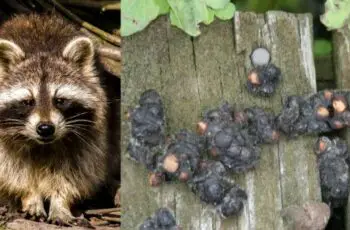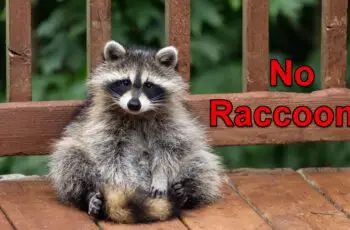Raccoons are known for their resourcefulness and adaptability, especially regarding food. Truth be told, raccoons serve a large number of things from everything. As opportunistic omnivores, raccoons will eat just about anything they can find, and their diet usually differs in wild and urban areas. But ever wonder What can raccoons eat? what to do if a raccoon ingests something dangerous?
In this comprehensive guide, we will discuss the natural diet of raccoons, which foods are harmful to raccoons, and the health risks associated with an inappropriate diet. We will also provide tips on how to minimize raccoons’ access to harmful foods and what to do if a raccoon ingests something dangerous.
What can raccoons eat?
Learning about raccoons means What can raccoons eat? what to do if a raccoon ingests something dangerous? You might have seen raccoons roaming around your area, digging into garbage cans and yards. Well, raccoons can literally eat and digest anything and everything. Raccoons are wild animal and their body can function with wild foods and resources.
The list of what raccoons do will never end because just like we humans. Raccoons discover new foods every day some of which might even hurt them but they still eat. Moreover, raccoons eat differently in the winter and in the summer because they have much more resources in the summer than in the colder seasons.
Raccoons can eat:
Eggs, fruits, vegetables, nuts, dead animals, crayfish, frogs, fish, snails, insects, apples, peaches, plums, cherries, berries, oranges, bananas, worms, mealworms, slugs, chicken eggs, duck eggs, bird eggs Birds, corn, nuts, Pet foods, shellfish, Rats, groundnuts, peanuts, acorns, beechnuts…
American raccoons might tend to ingest more desperate food than raccoons dwelling in Japan due to their environmental variation. However, not all foods are safe for raccoons to consume.
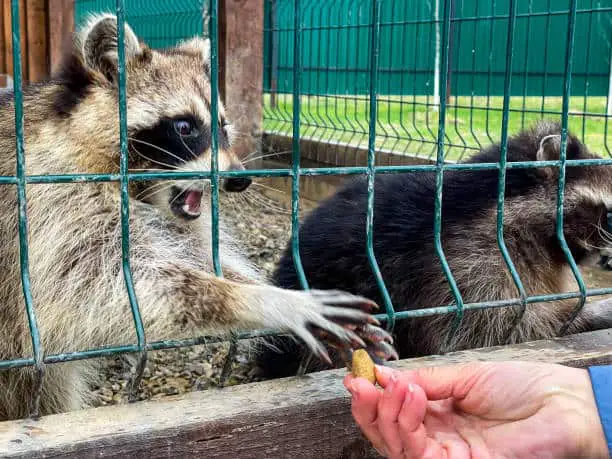
Foods Harmful to Raccoons
Raccoons are not restricted to a single food source. They consume a vast majority of resources like plants, vertebrates, and invertebrates which often cause them to be harmed. Commonly, processed human foods can be particularly dangerous for raccoons due to their high sugar, fat, and salt content.
These foods include fast food, junk food, sugary snacks, beverages, salty chips, and crackers. Furthermore, to prevent raccoons from being harmed, you have to bar them from certain human foods that can be toxic or cause severe health issues for raccoons. Some of these foods are as follows.
Foods that can be toxic to raccoons
The following foods are toxic to raccoons due to containing some ingredients that raccoons are not able to digest. It is beneficial for raccoons to avoid these delicious but harmful meals.
- Chocolate and caffeine: Raccoons’ digestive systems are not designed to break down sugar and similar substances. In this case, chocolate and caffeine will cause raccoons to increase their rapid heart rate, tremors, and seizures.
- Grapes and raisins: Usually they will stop them from being active and lessen the raccoon’s agility because they are extremely toxic to raccoons and can lead to kidney failure.
- Onions, garlic, and chives: Raccoons hate garlic and onions in particular; you need to stop them if they are willing to consume them. Most people use onion spray to push the raccoons away from their properties by spraying the locations that raccoons have visited because garlic, onion, and chives can cause anemia and gastrointestinal irritation to raccoons.
- Avocado: There is another issue that is not convenient for raccoons. Especially avocado and other things that contain a toxin substance called persin, which can cause gastrointestinal distress, vomiting, and heart problems.
- Nuts and seeds: Sometimes raccoons, specifically young raccoons, are not able to chew nuts and seeds and break them with their teeth to be digested, which can be a choking hazard or cause intestinal blockage after consumption.
- Alcohol: Not only is drinking alcohol harmful to humans, but it is also toxic to raccoons. By consuming alcohol, raccoons are likely to suffer severe liver and brain damage.
In addition, if your raccoon has eaten poisonous food to its health continue reading to find out what to do if a raccoon ingests something dangerous.
- Related: How to identify the sex of raccoons?
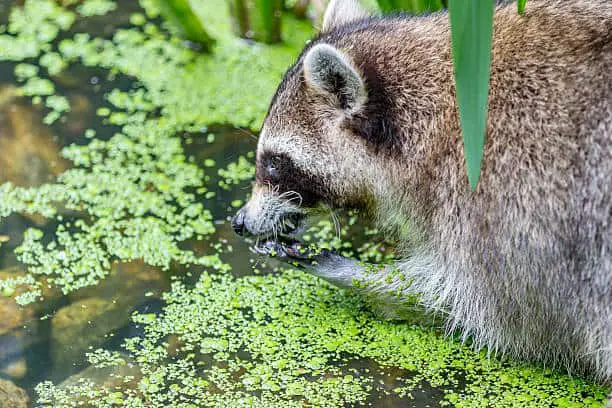
What can a raccoon eat?
Foods that cause digestive issues for raccoons
Besides, some other types of foods can cause digestive issues in raccoons. Although some foods may not be toxic to raccoons but can still cause digestive problems, read on to find out which dishes may compel raccoons to skip out.
- Dairy products: People endure diarrhea, and it is uncomfortable for raccoons too. Raccoons are lactose intolerant and can experience diarrhea and gas from consuming dairy.
- Raw eggs can contain bacteria like Salmonella and cause gastrointestinal issues.
- Yeast dough: This causes raccoons to digest them very well and can expand in the stomach, causing painful bloating and possible blockage.
Large amounts of fatty foods: When raccoons overconsume foods, it can lead to obesity and pancreatitis. Most raccoons are overweight because they ingest a variety of foods that usually create a thick layer of fat over their bodies.
It is pivotal to mention that human interaction impacts a raccoon’s diet. As human populations continue to expand into raccoon habitats, these animals have learned to take advantage of our food sources. Urban and suburban environments offer raccoons access to distinctive resources.
- Also, Searched For: Can raccoons be a good pet?
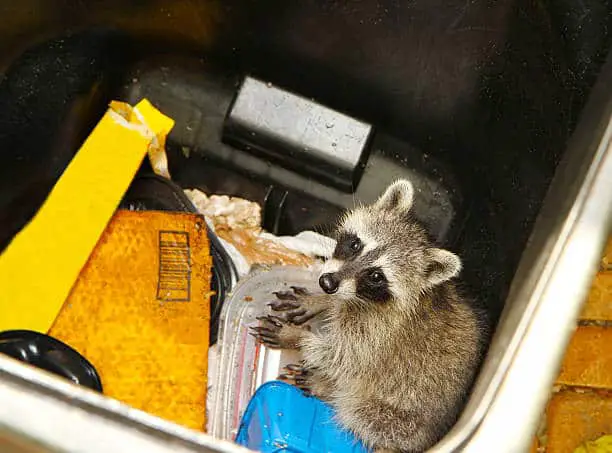
HEALTH RISKS ASSOCIATED WITH INAPPROPRIATE DIET
If you are a wild supporter, then you should avoid feeding raccoons inappropriate food that causes extreme damage to the raccoon’s health and lifestyle. Raccoons are omnivores and have an endless diet range; as a result, 98% of raccoons are affected by obesity. It is so sophisticated that the majority of raccoons are fed inappropriately. This is because they eat anything. Inferred from this if raccoons are fed improper meals, they encounter various health issues, including:
- Obesity and related health issues: It is one of the most challenging issues not only among humans but also with wild animals, specifically raccoons because devouring fatty food will lead to disease, joint problems, and reduced mobility for the raccoons.
Malnutrition and deficiencies: Providing plenty of nourishment results in severe health troubles; however, a lack of essential nutrients can lead to poor growth, a weak immune system, and other health obstacles.- Gastrointestinal problems: Mainly, raccoons are well known for the following reactions after consuming inappropriate foods: diarrhea, vomiting, and gastrointestinal blockages.
- Kidney and liver damage: It is not possible to make raccoons understand that toxic foods can damage these vital organs, leading to long-term health issues or death, so it would be advantageous to prevent them or preserve toxic meals.
- Toxicity and poisoning: Ingestion of toxic substances can cause severe health complications or even death to all sorts of living beings, particularly raccoons that devour divergent sustenance.
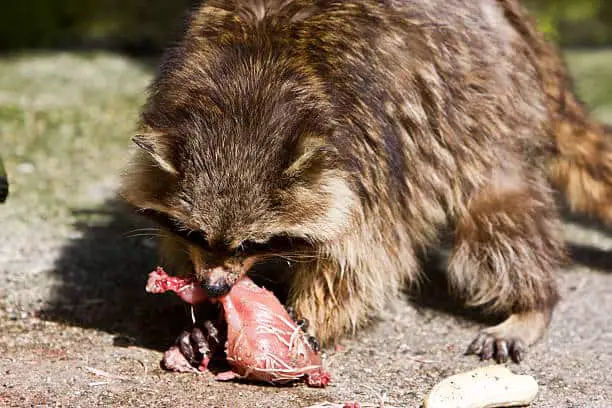
MINIMIZING RACCOONS’ ACCESS TO HARMFUL FOODS
Humans have a strong digestive system, which enables them to process complex mixtures and use beneficial substances. On the other hand, a large part of mammals, including raccoons, are without such capabilities. In order to keep raccoons secure and healthy, people have to minimize their access to hazardous foods. Following this paragraph, you will find some methods to help you manage raccoons’ accessibility.
- Standardize your environmental garbage cans and compost bins, for instance.
- properly seal lids to prevent raccoons from accessing the contents, as well as
- Use raccoon-proof containers with secure latches or locking mechanisms.
- It’s good to keep pet food storage and feeding away. To illustrate, make it a priority to secure your pet’s food. Also, avoid leaving pet food outdoors, especially overnight, because raccoons possess strong claws and can climb fences, easily break into your property, and eat from your dog or cat’s dish with pride and happiness.
- While holding parties and picnics in an open area, keep in mind to clean up spilled food promptly to prevent attracting raccoons. Besides, securely store pantry items, especially those that can be toxic to raccoons, and try to minimize outdoor dining and picnicking, or clean up food and waste thoroughly afterward.
Likely one of the finest mechanisms is to educate others. By guiding others, it is possible to inform neighbors and community members about the dangers of feeding raccoons. Moreover, raises awareness about the importance of responsible wildlife interaction, preventing hurting wild animals, and protecting them.
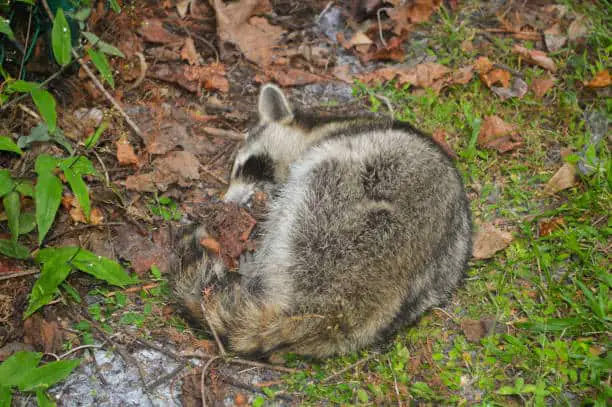
Sick Raccoon
WHAT TO DO IF A RACCOON INGESTS HARMFUL FOODS
If you suspect a raccoon has ingested harmful foods, it’s crucial to act quickly and responsibly for two significant reasons.
- First, raccoons are innately dangerous to humans and communities if they die. As a result of carrying distinctive deadly viruses that can spread in urban regions, which might lead to citizen infection.
- Second, it is not noble to witness an animal die, even if you can save it.
Eventually, noticing a raccoon that is in trouble, you need to look for identifying signs of illness, such as lethargy or weakness, that mostly raccoons lose their potential to walk consciously and deliberately. Likewise, vomiting and diarrhea are other signs that prove a raccoon has ingested something inconvenient and requires immediate assistance.
What’s more, raccoons demonstrate several other symptoms, like tremors, seizures, loss of appetite, difficulty breathing, or a rapid heart rate, when they have taken in some harmful things. After all, if you confront such a condition, you are obliged to stick to the steps below to save the raccoon’s life.
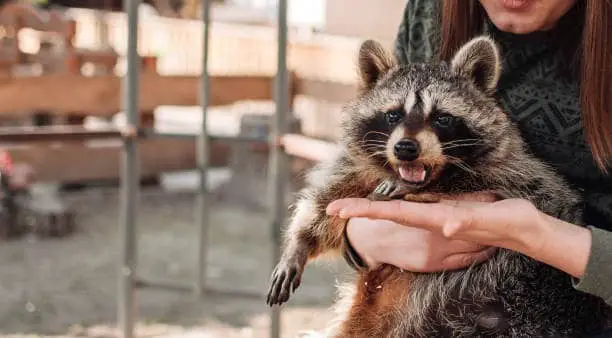
Sick Raccoon
- Contact local wildlife rehabilitators. They have the expertise to handle sick or injured raccoons and can provide appropriate care.
Seek veterinary assistance for pet raccoons. If you have a pet raccoon, consult with your veterinarian immediately for advice and treatment.
Report to local authorities if necessary. In cases of suspected poisoning or other malicious acts, notify the appropriate authorities to investigate the situation and take action.
prevention and ongoing care are necessary to minimize the risk of raccoons ingesting harmful foods in the future. Take preventive measures like securing garbage cans and educating others. If you have a pet raccoon or are involved in wildlife rehabilitation, ensure they receive a proper diet to support their health.
Professional Help:
Seeing a dead, injured, or trapped animal, especially a raccoon can be heartbreaking. During such situations or sometimes simple cases such as facing a sick raccoon must inform local authorities or professional helpers. Moreover, you can ask help from a professional to save you and your house from raccoons. Moreover, make sure to check your state or country’s roles about raccoons.
Some countries don’t allow raccoons as pets or have them around cities. Furthermore, some countries have a special group of helpers for raccoons.
FAQ
CONCLUSION
To sum up, humans are responsible for protecting their environment and collaborating with other living beings to live safely and soundly. What can raccoons eat and the damage when they digest dangerous food has a direct connection to humans. Safe living demands a few requisite tactics, e.g., understanding which foods are harmful to raccoons is essential for their well-being and the safety of our shared environments, avoiding hazards caused by an improper diet, and limiting raccoons to risky snacks. Moreover, learning What can raccoons eat? what to do if a raccoon ingests something dangerous?
As well, by taking steps to minimize their access to these dangerous foods and acting quickly when a raccoon is in distress, we can help these resourceful creatures thrive. Last but not least, responsible wildlife interaction is the key to promoting a harmonious relationship between humans and raccoons. They can provide a wide range of support to wildlife’s safety and other subjects from being harmed by food resources and animals affected by post-affection matters.

